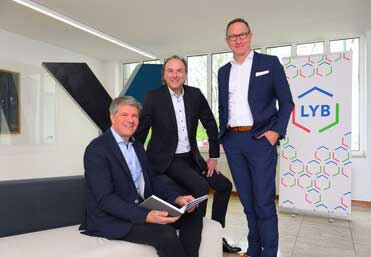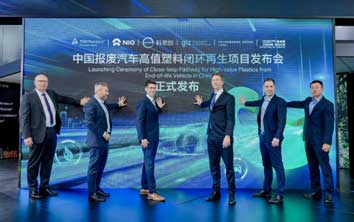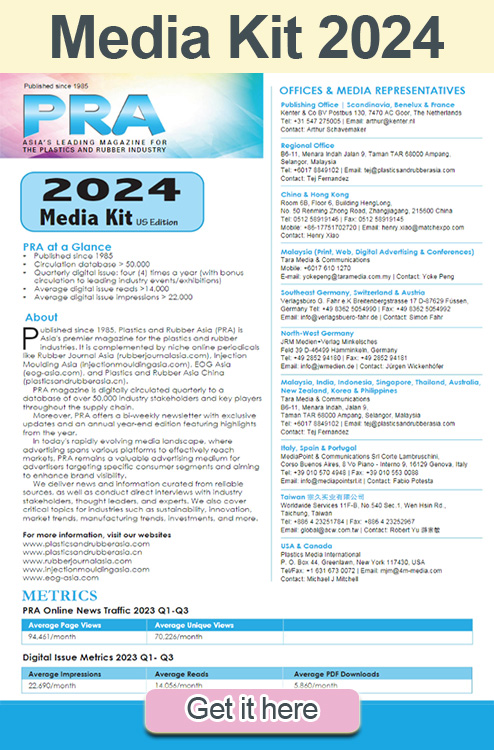Recycling: LYB to build waste recycling hub in Knapsack; Covestro/automotive partners to collaborate on car-to-car plastic recycling

Chemical firm LyondellBasell (LYB) says it has secured a location for an integrated plastic waste recycling hub south of an existing industrial park in Knapsack, Germany, signing a land lease agreement with industrial firm Yncoris GmbH & Co. KG.
The hub is planned to combine various advanced sorting and recycling operations, helping to address the plastic waste challenge and grow the circular economy. The project will be developed in phases; the initial phase will see the construction of an advanced sorting facility that will process mixed plastic waste to produce feedstock for mechanical and advanced recycling. This mixed plastic waste is not recycled today and mostly sent to incineration for energy recovery.
In total, the integrated recycling hub will cover an area equivalent to 20 soccer fields. It is expected that the hub's initial advanced sorting facility will start operations in the first quarter of 2026. These new investments support the company's ambition to produce and market at least 2 million tonnes/year of recycled and renewable‑based polymers by 2030.
"The industrial park in Knapsack is the ideal location for our integrated hub as is it close to our world-scale facilities in Wesseling and will allow us to develop additional technologies for the recycling of plastic waste," says Yvonne van der Laan, LyondellBasell Executive Vice President, Circular and Low Carbon Solutions. "The integration of various technologies will allow us to build scale and offer our customers a wide range of products from recycled and renewable resources."
"The integrated recycling hub will also produce feedstock for the advanced recycling unit the company will build at its Wesseling site," says interim Wesseling-Knapsack site manager Stephan Staender. "The new hub will also provide opportunities for synergies with the company's mechanical recycling facility in Geleen, Netherlands and the company's polypropylene compounding facility in Knapsack."

With increasing global environmental awareness and stricter regulatory requirements, the automotive industry is realising the necessity of plastic recycling for sustainable development. In response, materials manufacturer Covestro, along with partners from the automotive value chain, says it is spearheading the concept of car-to-car closed-loop plastics recycling, which is emerging as a promising solution to tackle the challenges of plastic waste management in the sector.
Under a joint pilot program initiated by German federal enterprise GIZ (Deutsche Gesellschaft für Internationale Zusammenarbeit), Covestro and partners will collaborate to establish closed-loop pathways for high-value plastics from end-of-life vehicles (ELVs). The goal is to create an efficient and sustainable automotive plastic recycling system, advancing the more sustainable “transformation of the industry”.
The pilot program was announced at Covestro’s booth during the recent Chinaplas 2024 itrade fair in Shanghai. Notable partners include leading automotive brand owners such as NIO of China and Volkswagen, Chinese recycling company GEM, and third-party certification bodies like TÜV Rheinland.
As part of the pilot program, a team of professionals will explore methods to recycle and process waste polycarbonate components, such as end-of-life car headlights, into post-consumer recycled (PCR) polycarbonates. The recycled materials will then be reused for various interior and exterior vehicle applications, saving resources and reducing carbon emissions.
This could offer urgently needed long-term solutions for the automotive manufacturing industry, which seeks high-quality PCR materials that are compliant and high-performance amid increasingly stringent regulations. For example, in 2023, the European Commission proposed a new regulation to enhance the circularity of the automotive sector, mandating that 25% of the plastics used in a new vehicle must come from recycling, of which 25% must be recycled from end-of-life vehicles.
"We are proud to partner with like-minded value chain allies to pioneer closed-loop plastic recycling in the automotive sector," said Lily Wang, Global Head of the Engineering Plastics Business Entity at Covestro. "By leveraging our collective strengths and resources, we are confident in our ability to build a closed-loop for automotive plastics recycling, thereby reducing waste and carbon emissions at the source while improving resource use efficiency. Through this joint program, we aim to expedite the automotive industry’s transition toward a more climate-neutral and sustainable future."
"The automotive industry stands as one of the most resource-intensive sectors globally, yet the potential of high-value plastics from ELVs remain largely untapped," said Martin Hofmann, Cluster Head in charge of Climate, Energy, Environment and Biodiversity at GIZ. "GIZ is steering an innovative endeavor to explore closed-loop pathways for high-value plastics from ELVs. I firmly believe that GIZ and our partners can forge a path towards the transition to a sustainable, circular economy."
(IMA)Subscribe to Get the Latest Updates from IMA Please click here
©2024 Injection Moulding Asia. All rights reserved.















